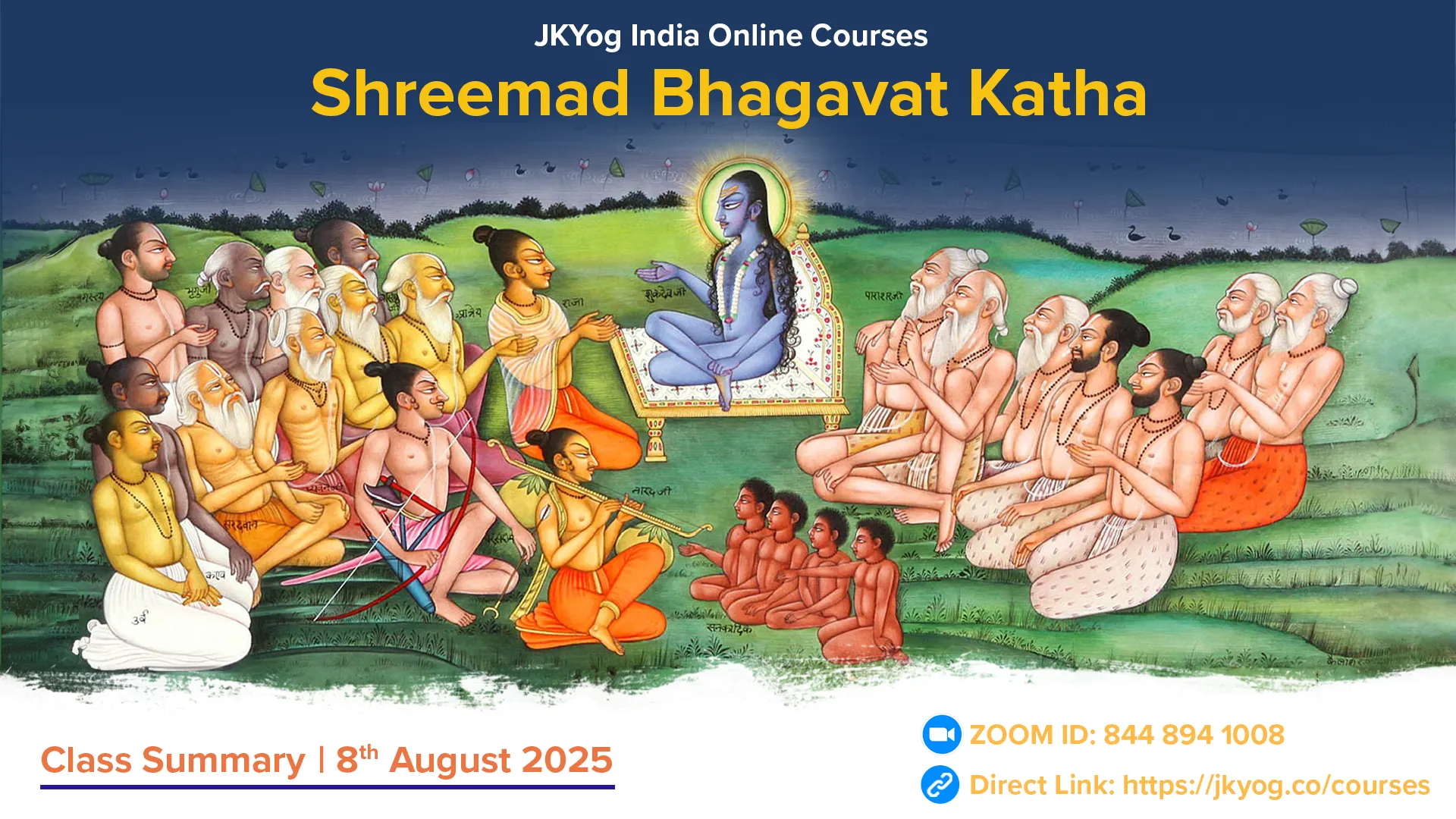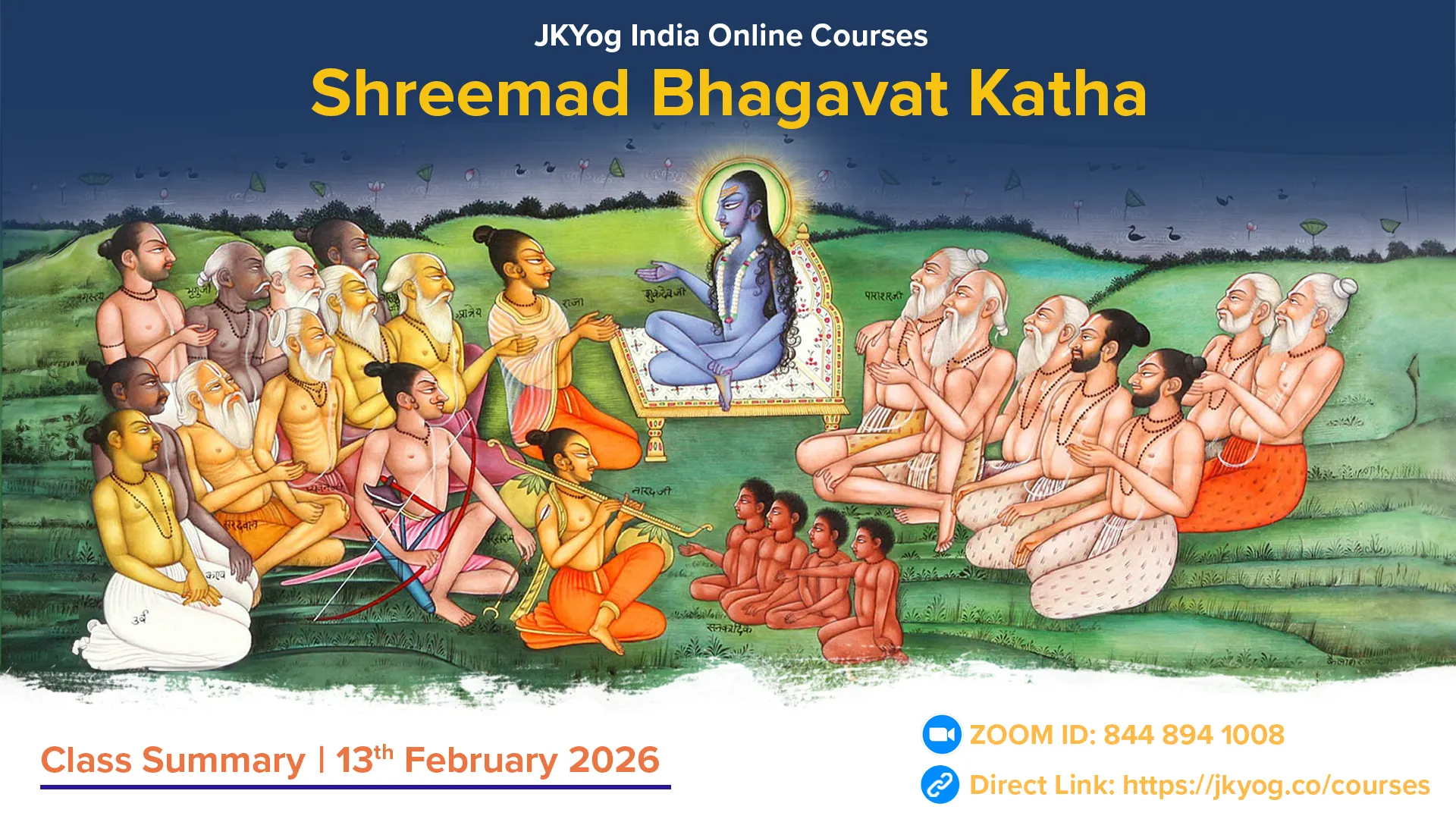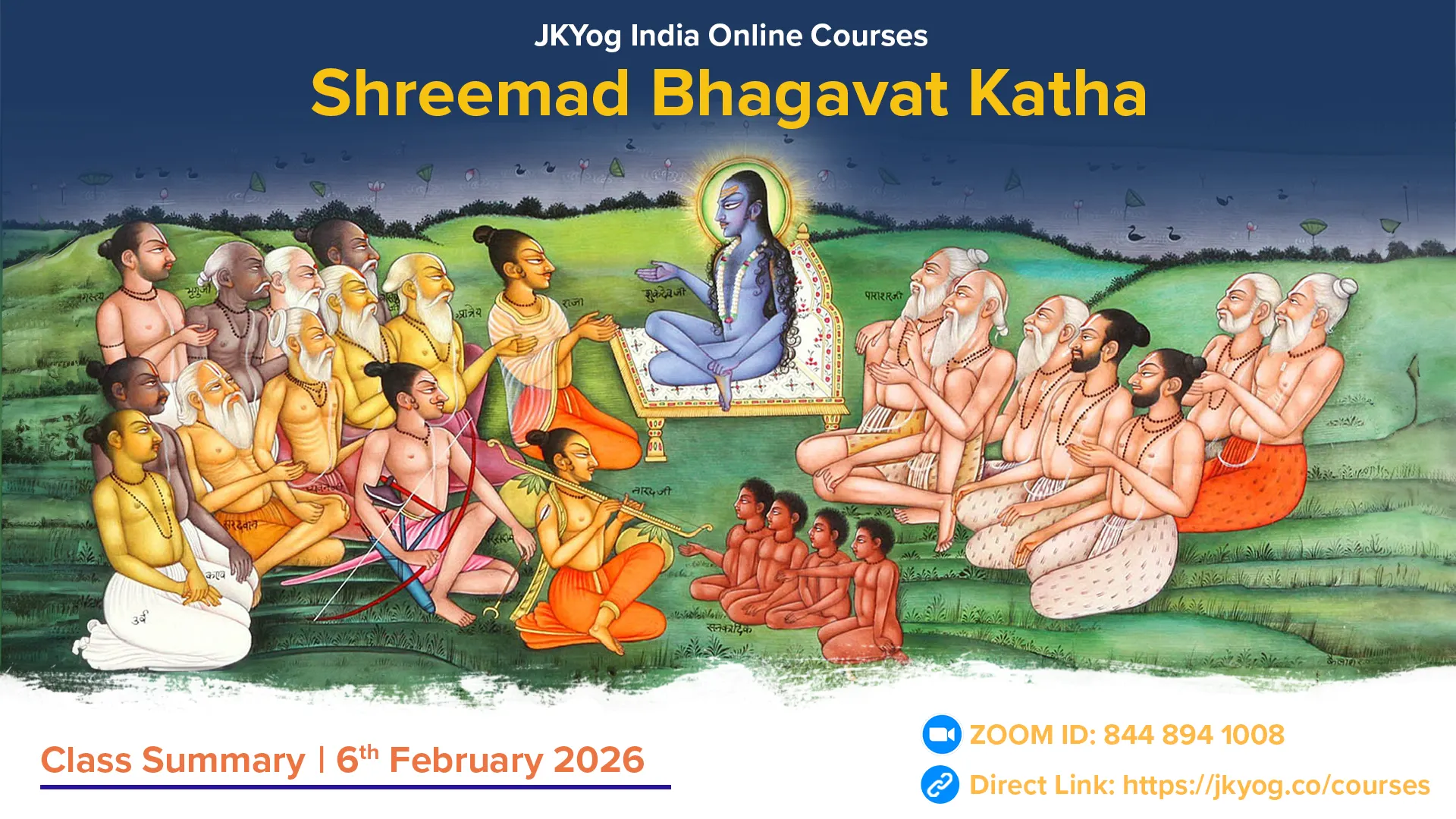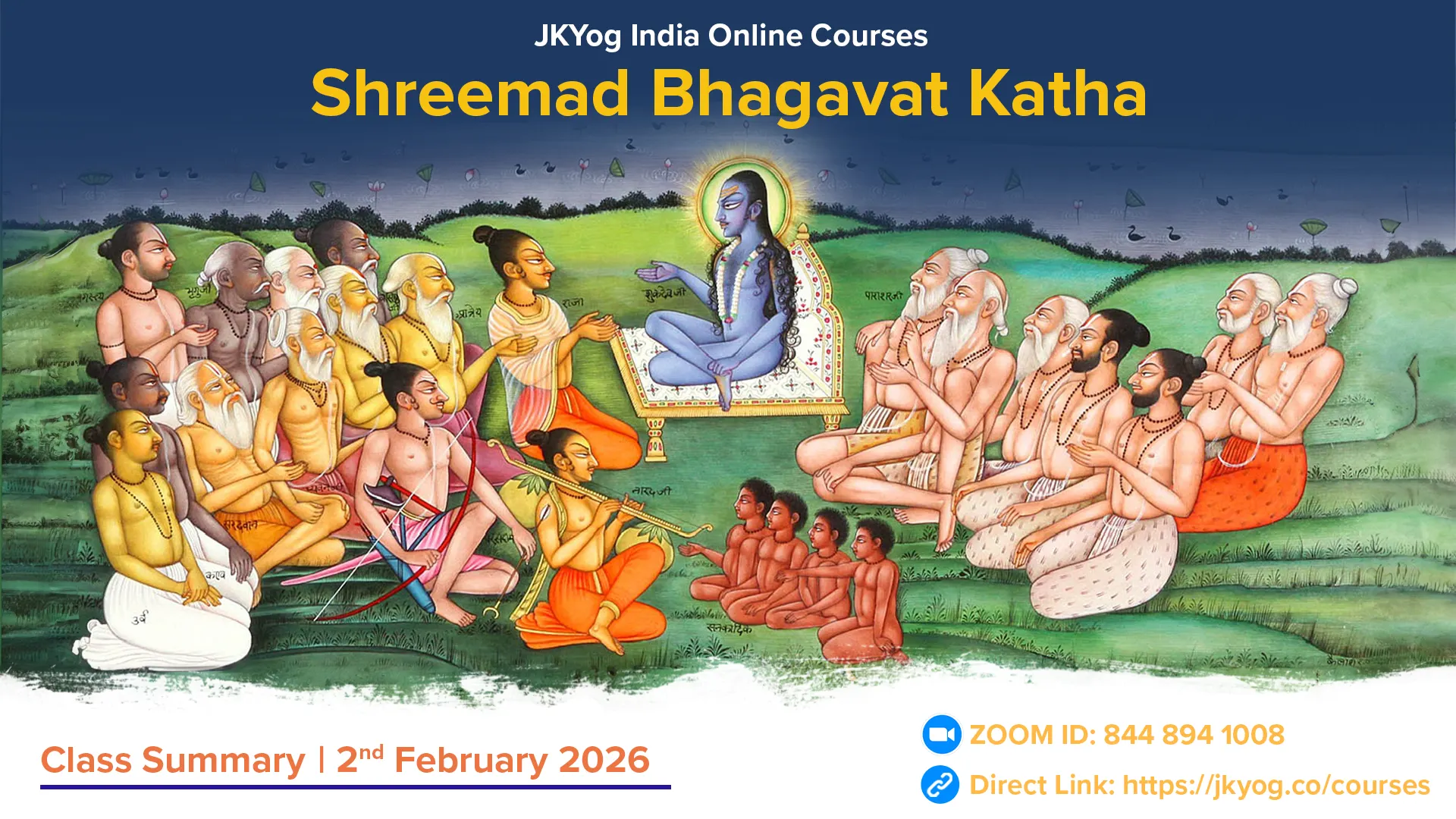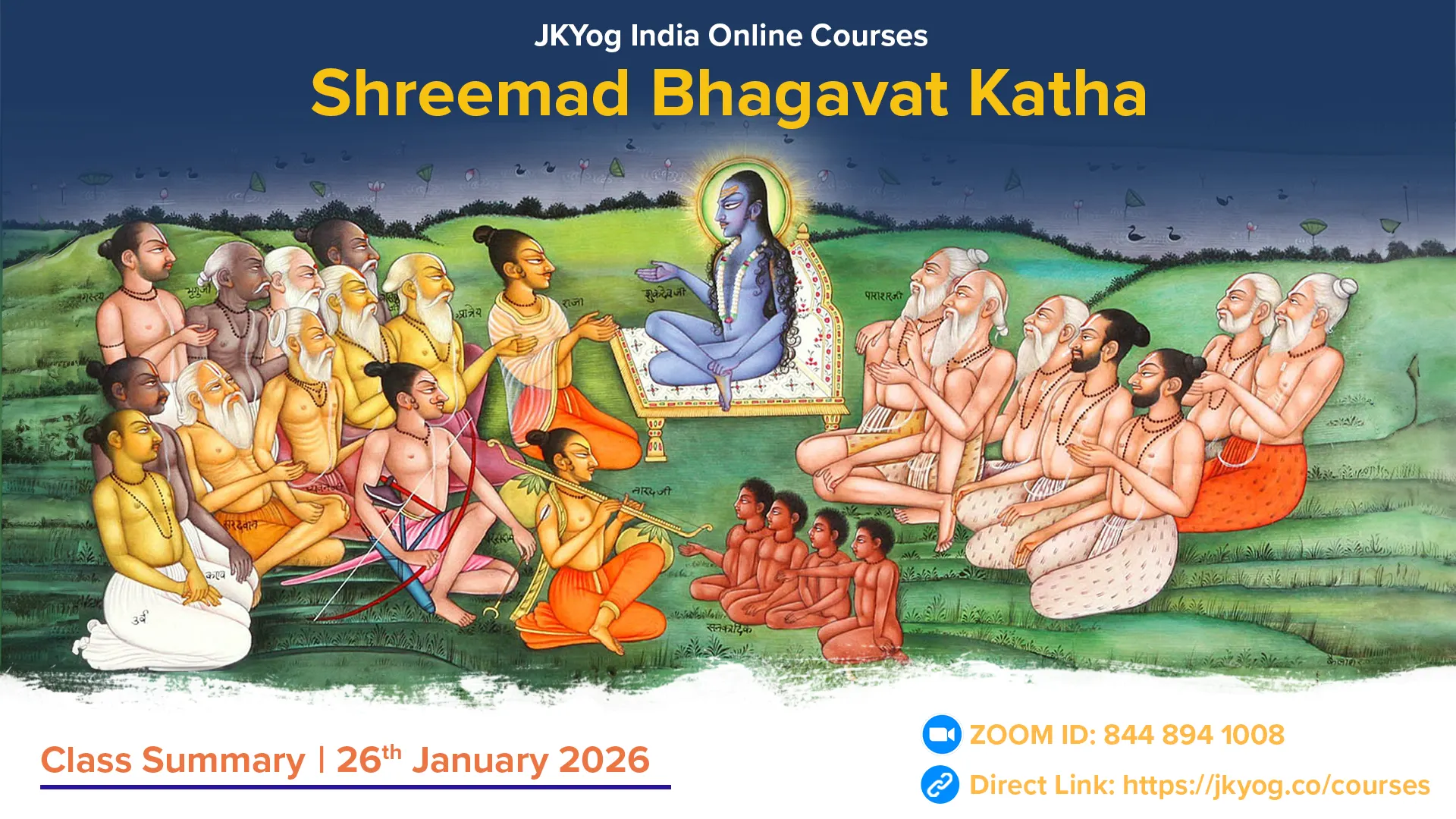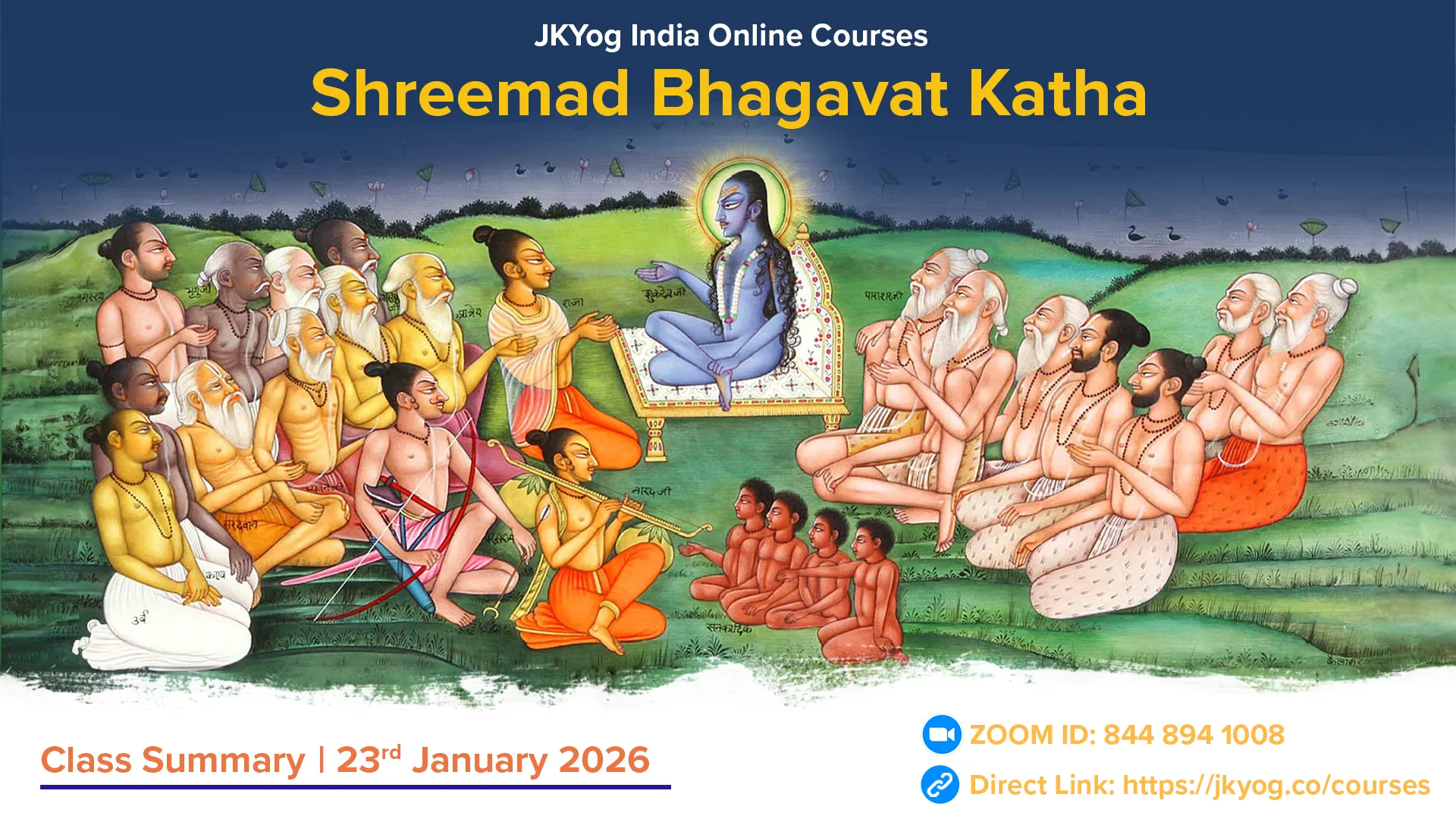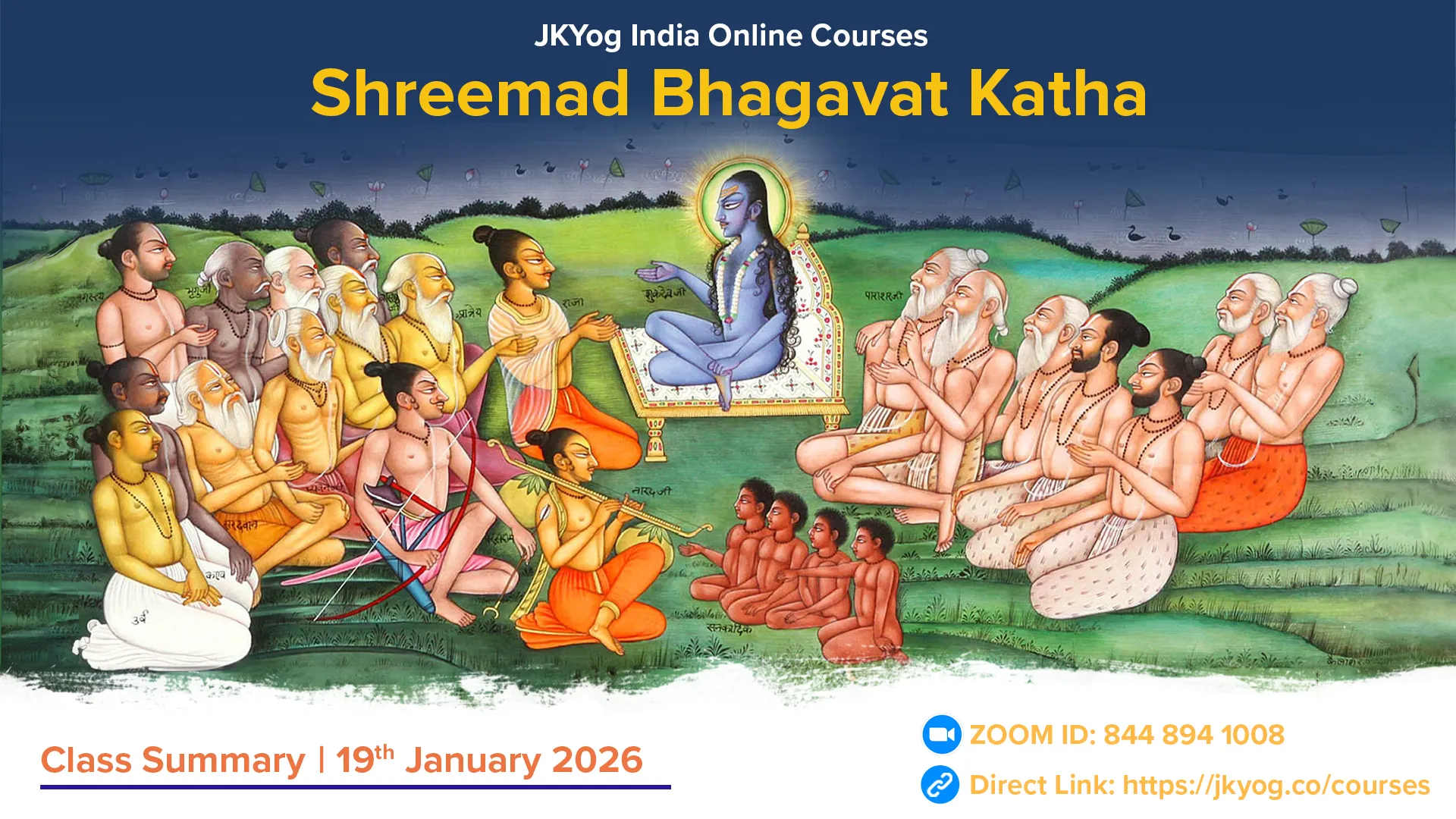Shreemad Bhagavat Mahapuran- Canto: 9, Chapters: 20-21
Shree Shukadevji says to Parikshit, “O King! You are born in the illustrious lineage of King Puru. In this dynasty, many radiant Rajarshis and Brahmarshis have appeared. Puru’s son was Janamejaya. From Janamejaya was born Prachinvan, from Prachinvan came Praveer, from Praveer came Namasyu, and from Namasyu was born Charupada. From Charupada came Sudhu, from Sudhu came Bahugava, from Bahugava came Samyati, from Samyati came Ahanyati, and from Ahanyati was born Raudrashva.
From the apsara Ghritachi, Raudrashva had ten valiant sons- Riteyu, Kukshéyu, Sthandileyu, Kriteyu, Jaleyu, Santateyu, Dharmeyu, Satyeyu, Vrateyu, and the youngest, Vaneyu. Riteyu’s son was Rantibhara, who had three sons- Sumati, Dhruva, and Apratiratha. From Apratiratha was born Kanva. Kanva’s son was Medhatithi, and from Medhatithi descended Praskanna and other Brahmins. Sumati’s son was Raibhya, and Raibhya’s son became renowned as Dushyanta.”
Love Story of Dushyanta and Shakuntala
Once, King Dushyanta went hunting in the forest with some of his soldiers. While pursuing the hunt, he arrived at the hermitage of Sage Kanva. There, seated in the ashram, was a woman of extraordinary beauty, whose radiance illuminated the entire place. She was Shakuntala.
Seeing the graceful Shakuntala, King Dushyanta felt deep joy. A sense of love and attraction arose in his heart. After resting for a while, he smiled and spoke in a sweet voice, “O lady with lotus-petal eyes! Who are you, and whose daughter are you? What brings you to this solitary forest? Your beauty has captivated my heart. I sense that you must be a Kshatriya maiden, for the descendants of Puru never deviate from Dharma.”
Shakuntala replied, “O King, you are right. I am the daughter of Sage Vishwamitra. My mother, the apsara Menaka, left me in the forest at birth. Sage Kanva raised me with care; he is my protector. O noble one, how may I serve you? Please be seated in our hermitage and accept our hospitality. Here, niwar (forest rice) is available. If you wish, partake of it as food, or if you desire, rest here awhile.”
Dushyanta said, “Fair one! Since you were born in the lineage of Kushika, it is natural for you to offer such hospitality. A Kshatriya maiden chooses her worthy husband by her own will.”
Thus, when Shakuntala too gave her consent, King Dushyanta, honouring the propriety of time, place, and scripture, married her according to the Gandharva rite. The royal sage Dushyanta’s seed was unfailing. He spent that night in the hermitage with Shakuntala. The next morning, he returned to his capital. In due course of time, Shakuntala gave birth to a son.
The Glory of Shakuntala’s Son Bharat
In the forest, Sage Kanva performed all the jatakarma (birth ceremony) and other samskaras for the young prince, Bharat, with due ritual. From childhood itself, the boy was so powerful that he would capture mighty lions, bind them, and play with them. He was a partial incarnation (anshavatar) of the Supreme, endowed with limitless strength and valour.
In time, Shakuntala took her son to her husband, King Dushyanta. But when the king, clouded in doubt, refused to accept his innocent wife and child, a celestial voice resounded from the heavens, “Dushyanta! What Shakuntala speaks is true. You are indeed the father of the son she bears.”
After the death of King Dushyanta, his son Bharat ascended the throne as the Chakravarti Samrat. Born as a divine portion, his glory is still sung upon the earth. A discus mark was imprinted on his right hand, and lotus symbols adorned his feet. Through the mahabhishek ceremony, he was enthroned as King of Kings. Bharat became a most valiant and powerful ruler.
He appointed the sage Dirghatama, son of Mamata, as his royal priest. On the banks of the Ganga, from Gangasagar to Gangotri, he performed fifty-five Ashwamedha sacrifices. Similarly, on the banks of the Yamuna, from Prayag to Yamunotri, he performed seventy-eight Ashwamedha sacrifices. In these grand yajnas, he donated immense wealth and countless cows, so much that each of a thousand Brahmins received thirteen thousand cows. Altogether, Bharat conducted one hundred and thirty-three Ashwamedha sacrifices, astonishing all kings by consecrating one hundred and thirty-three horses. These sacrifices brought him immense renown, and ultimately, transcending illusion (Maya), he attained Bhagwan Shree Hari.
In a special rite of the sacrifice, called Mashnar, Bharat donated fourteen lakh elephants, black in colour, white-tusked, and adorned with golden ornaments. Such a magnanimous act had never been accomplished by any king before, nor would it be surpassed in future. In his campaigns of conquest (digvijaya), Bharat defeated many rulers, including the Kiratas, Hunas, Yavanas, Andhras, Kankas, Khasas, Shakas, and Mlecchas. In ancient times, when the Asuras overpowered the Devas, driving them to the netherworld and imprisoning many celestial maidens, Bharat liberated them all.
During his reign, the earth and the heavens themselves fulfilled the needs of his subjects. He ruled unchallenged over all directions for twenty-seven thousand years. At last, Emperor Bharat realised, “Even this wealth that astonishes the guardians of the worlds, this limitless dominion, this grandeur, and even life itself are all perishable.”
Understanding this truth, he renounced worldly attachments and became detached from the material world. Bharat’s queens were the three daughters of the king of Vidarbha. But Bharat saw that their sons were not worthy of the throne. For progeny, he performed the Marutsoma Yajna. Pleased with his devotion, the Maruts granted him a radiant son, Bharadvaja. Bharadvaja grew to be highly learned and virtuous, and in time, became the sustainer of the Bharat dynasty.
The Story of the Generous King Rantideva
Bharadvaja’s son was Manyu. Manyu had five sons- Brihatkshatra, Jaya, Mahavirya, Nara, and Garga. Nara’s son was Sankriti, and Sankriti had two sons- Guru and Rantideva. The spotless fame of Rantideva is sung in this world as well as the next. His life is an extraordinary example of compassion, sacrifice, and devotion.
Rantideva never lived by his own enterprise; whatever came to him by providence, he accepted, and that too he would share with others. He himself remained hungry and thirsty, detached from hoarding and possessiveness. Gradually, his wealth diminished, and he began to suffer extreme hardships with his family.
Once, it so happened that for forty-eight days, he did not even have water to drink. On the forty-ninth morning, by chance, he received a little ghee, kheer, halwa, and water. His family, trembling from hunger and thirst, was just about to eat when a Brahmin guest arrived. Seeing the divine in every living being, Rantideva immediately offered the food to the Brahmin with reverence.
The Brahmin ate and left. Whatever little food remained, the family divided among themselves and was about to eat when a Shudra guest came. Remembering God, Rantideva set aside a portion for him as well and offered it lovingly.
Then another guest appeared, this time with his dogs. He said, “O King! My dogs and I are starving. Please give us food.”
Rantideva, bowing inwardly to God, gave away all that remained with him to them too, for he saw the same divinity present in all. Now, only water was left. Rantideva and his family were about to share it when a Chandala (outcaste) arrived, pleading in a trembling voice, “I am lowly, I am dying of thirst. Please give me water.”
Hearing his pitiful words, Rantideva’s heart overflowed with compassion. Remembering God, he spoke in nectar-like words, “I do not seek from the Lord the eight mystic powers, nor liberation, nor even the supreme abode. My only wish is that I may dwell in the hearts of all beings and take upon myself their sufferings, so that no creature in this world may endure sorrow.”
Saying this, he gave the last remaining water to the Chandala. Though he himself was at the brink of death without water, his heart was so full of compassion that he could not refrain.
This entire episode was a divine play arranged by Vishnu, Brahma, and Mahesh. Disguised in various forms, they were testing Rantideva’s sacrifice and devotion. When the test was complete, the three revealed their true forms. Rantideva bowed humbly at their feet, yet asked for nothing. His heart was already free from all attachments and desires. He remained absorbed only in devotion and love for Bhagwan Vasudev. Such was his influence that his companions, too, advanced on the path of Yog and became devotees of God.
Manyu’s son was Garga. From him was born Shini, and from Shini came Gargya. Although Gargya was a Kshatriya, from him a Brahmin lineage began. Mahavirya’s son was Duritaksaya, who had three sons- Tryyaruni, Kavi, and Pushkararuni. All three became Brahmins. Bahukshatra’s son was Hasti, the founder of Hastinapura. Hasti had three sons- Ajamidha, Dwimidha, and Purumidha. From Ajamidha’s line arose Brahmins like Priyamedha.
Ajamidha’s son was Brihadishu. Brihadishu’s son was Brihaddhanu, from whom came Brihatkaya, and from him Jayadratha was born. Jayadratha’s son was Vishada, from whom came Senajit. Senajit had four sons- Ruchirashva, Dridhanemi, Kashya, and Vatsa. Ruchirashva’s son was Par, from whom came Prithusen, and Par’s other son was Neepa.
Neepa had a hundred sons. He married Katyavi, the daughter of Shuka, and from this union was born Brahmadatta. Brahmadatta was a great yogi. His wife Saraswati bore him a son named Vishvaksena. Vishvaksena studied under Acharya Jaigishavya and composed the Yogashastra. Vishvaksena’s son was Udakswana, from whom came Bhallada. All of these were descendants of Brihadishu.
From Dwimidha came Yavinara, then Kritiman, then Satyadhriti, then Dridhanemi, and then Suparshva. From Suparshva came Sumati, from him Sannatiman, and from him Kriti. Kriti received the knowledge of Yoga from Hiranyanabha and revealed six samhitas known as the Prachyasama.
Kriti’s son was Neepa, from whom came Ugrayudha, from whom Kshemya, then Suveera, and finally Ripunjaya. Ripunjaya’s son was Bahuratha. Dwimidha’s brother Purumidha remained childless. Ajamidha’s second wife, Nalini, bore a son named Neela. From him came Shanti, from him Sushanti, from him Puruja, from him Arka, and from him Bhashva. Bhashva had five sons- Mudgala, Yavinara, Brihadishu, Kampilya, and Sanjaya. Bhashva declared, “All five of these are fit to rule.” Therefore, they came to be known as the Panchalas.
From Mudgala arose the Maudgalya Brahmin lineage. Mudgala also had twin children- Divodasa and Ahalya. Ahalya was married to Sage Gautama, and their son was Shatananda. Shatananda’s son was Satyadhati, who was skilled in the science of archery. Satyadhati’s son was Sharadvan. Once, on seeing the apsara Urvashi, Sharadvan’s seed fell upon the ground, and from it were born a son and a daughter. King Shantanu, moved by compassion, took both children under his care. The son was named Kripacharya, and the daughter Kripi. In time, Kripi became the wife of Dronacharya.
Summary: JKYog India Online Class- Shreemad Bhagavat Katha [Hindi]- 08.09.2025

